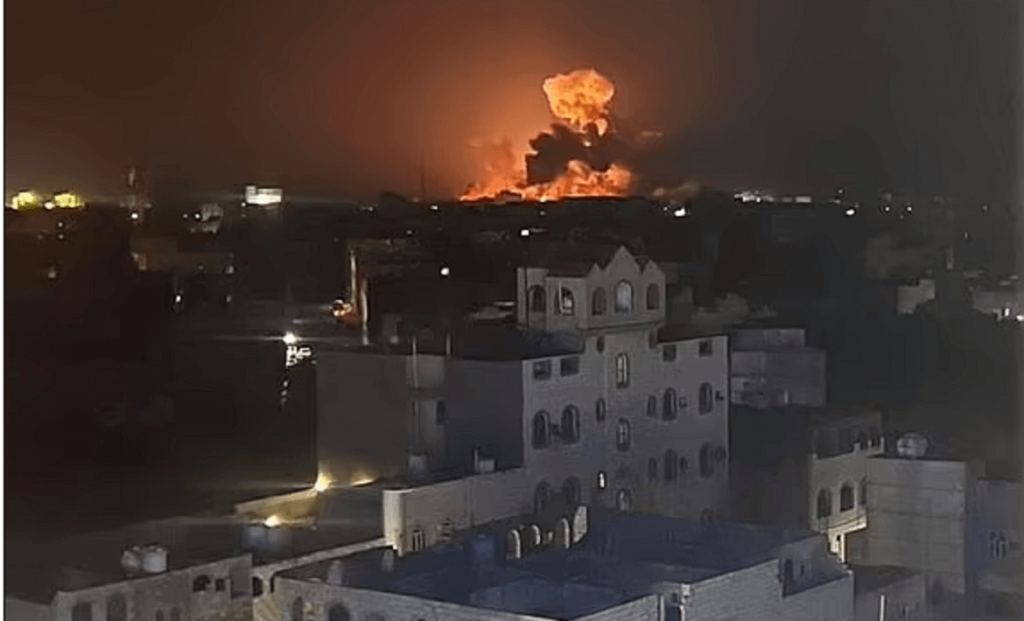By Nikola Mikovic
While the United States continues conducting airstrikes on Houthi targets in Yemen, Ukraine fears it will eventually be completely abandoned by Washington and its European allies. Although the situation on the front line is still not critical for the Ukrainian military, policy makers in Kyiv seem worried about Western preoccupation with conflicts in the Middle East.

Ever since Hamas attacked Israel on October 7, the world’s attention has swung away from the nearly two-year-old war in Ukraine. Recent US actions in Yemen have once again forced global media to shift away from the conflict in Eastern Europe.
“This world order always was, is, and will be, an ever-living fire, kindled in measures and extinguished in measures”, an ancient Greek pre-Socratic philosopher Heraclitus wrote some 2500 years ago. Indeed, after Russia and Ukraine signed the Minsk-2 Agreement in the winter of 2015, the Donbass war suddenly stopped making headlines, although the two sides continued fighting a low-scale positional warfare. But the global media no longer paid attention to the situation in Eastern Ukraine. Instead, all eyes were on Syria, where Russia launched a military intervention in September 2015.
Now that the West is concerned with conflicts in the Middle East, international media coverage of the Ukraine war has dropped markedly. On the ground, Russian and Ukrainian forces are fighting a de facto positional war of attrition, while the world is more focused on developments in Yemen, Israel, and Iran, than on the ongoing Russian invasion of the Eastern European country.
At the same time, Western policy makers seem to be divided over the level of support for Ukraine. The war-torn nations’ neighbors – Hungary, Slovakia, and Poland – indirectly sabotaged Kyiv’s war efforts by refusing to provide weapons to the Ukrainian Armed Forces. Even Germany, on January 17, rejected a proposal from the Christian Democratic Union (CDU) and Christian Social Union in Bavaria (CSU) parties on transferring long-range Taurus missiles to Ukraine. At the same time, the European Union has a hard time approving the €50-billion special fund for Ukraine. In other words, Western military and financial support to Ukraine looks highly uncertain.
All that, however, does not mean that the Kremlin will use the opportunity and resolve the conflict in its favor. At this point, Russia does not even have capacity and combat effectiveness to launch another large-scale offensive. There are no reports of major troop movements in Western Russia or Belarus, which indicates that the Kremlin, at least for the time being, aims to preserve the status quo in Ukraine.
But the problem for Moscow is the fact that with missile and drone attacks alone, Russia cannot achieve its goals in the Eastern European country. In order to win the war, the Kremlin would have to completely change its approach vis-à-vis Ukraine, which is something that Russian policy makers do not seem willing to do. As a result, Moscow and Kyiv will continue fighting a long war of attrition, where both sides will suffer heavy casualties.
Although for the West, at least for the foreseeable future, the situation in the Middle East will have priority over the war in Ukraine, it is unlikely that Western powers will completely stop arming Kyiv. Great Britain has recently said it would provide the largest delivery of drones to Ukraine, with most of them expected to be manufactured in the United Kingdom. Such a move will not have a decisive impact on the outcome of the war, but it will almost certainly help Ukraine to inflict significant losses on Russian forces.
The British-made Storm Shadow cruise missiles, that London began delivering to Kyiv in the spring of 2023, have reportedly already forced Russia to start making plans about relocation of its Black Sea Fleet from Crimea to Georgia’s breakaway region of Abkhazia. In the Middle East, on the other hand, despite harsh rhetoric that comes from Yemen’s Houthi forces and other Iran-backed militias, as well as Houthi strikes on various ships in the Red Sea, not a single American warship was sunk. Moreover, there is no visual confirmation, including satellite images, of destroyed American military bases in Iraq and Syria, despite Iranian proxy militias’ attacks that reportedly take place on a daily basis.
Thus, Iran’s allies’ actions in the region do not seem to represent a serious threat for the US military. As a result, Washington will continue playing the role of a major global actor operating in the Middle East, quite aware that Iran is not ready for a direct confrontation with the American forces in the region. Washington also knows that Iranian proxies are unlikely to get the green light from Tehran to inflict dramatic losses on the US military in the same way that Ukraine is doing to Russian forces.
On the other hand, American and British airstrikes on Yemen will almost certainly not force the Houthis to stop attacking their ships in the Red Sea. But neither will Ukrainian strikes on Russian assets in Crimea force the Kremlin to end the conflict and withdraw its troops from Ukraine.
In the coming months, the West will likely attempt to handle both the wars in Ukraine and in the Middle East simultaneously. The Kremlin, for its part, is expected to provide its Western partners with “security guarantees” that it will not raise the stakes in Ukraine as long as the US and its allies are preoccupied with the situation in the Middle East, as well as with its internal problems.
The world order will continue to be ignited in measures and extinguished in measures.
Author: Nikola Mikovic – Journalist, researcher and analyst based in Serbia.
(The views expressed in this article belong only to the author and do not necessarily reflect the editorial policy or views of World Geostrategic Insights).
Image Source: The Times







